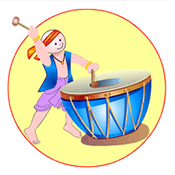
Dimdima
Online Children's Magazine from India

Dimdima
Online Children's Magazine from India

The Mayas of southern Mexico were fond of chewing gum. One of their heroes, Kukulkan, who was worshipped as a god is thought to have been a chewing-gum addict.
The Mayas called it chicle. It was obtained from wild sapodilla trees. They made cuts in the bark of the tree and collected the thick milky liquid that oozed out. When the liquid hardened, it was delectable to chew. The habit of chewing gum spread all over Central America. When the Spaniards invaded the Aztec Empire in 1518, they found people chewing energetically on gum, but the habit did not catch on with the Europeans.
The credit for introducing chewing gum to the rest of the world goes to the two Americans, Thomas Adams Jr. and William Wrigley Jr. These two men, independent of each other began to produce and market chewing gum in the 1870s.
The demand became so great that Mayan Indians had to work overtime to find gum yielding sapidilla trees. It was while searching for these trees that the ruins of many of the great Mayan cities of the past were discovered.
EXPLORE MORE...
Get Help or Give Help.
- Do you have a Science Question?
- Post it here and get the answer.
- Some questions posted by others are not yet answered.
- View those questions and answer them.
Dimdima is the Sanskrit word for ‘drumbeat’. In olden days, victory in battle was heralded by the beat of drums or any important news to be conveyed to the people used to be accompanied with drumbeats.
Bharatiya Vidya Bhavan
K. M Munshi Marg,
Chowpatty, Mumbai - 400 007
email : editor@dimdima.com
Bharatiya Vidya Bhavan
505, Sane Guruji Marg,
Tardeo, Mumbai - 400 034
email : promo@dimdima.com
Dimdima.com, the Children's Website of Bharatiya Vidya Bhavan launched in 2000 and came out with a Printed version of Dimdima Magazine in 2004. At present the Printed Version have more than 35,000 subscribers from India and Abroad.